About 2-3 weeks ago I got inspired by ncbluetj's BASH build which uses 4-15" !! https://www.diyaudio.com/community/threads/the-b-a-s-h.391536/page-6#post-7190481
Decided to see if I could retrofit a pair of 18" to an old synergy prototype....looked like it could work, providing a box could be built to wrap it.
The old proto is a 75x60 build that uses two 12"s, four 4"s, and a coax CD.
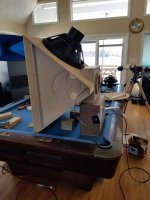
I'm like yeah, I can build a box around it, but it's going to be one heavy sucker. I'll need to build it on site, in its final resting place.
Decided I wanted to build it on a stand to match the height of other synergies sitting on tall subs. Used a vented sub box emptied and turned point up for the base.....(which already had coaster wheels, yay)
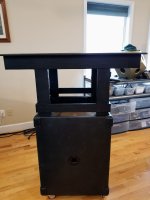
Built the box pieces and painted them. Time to assemble.
First thing was to mount the 12"s and seal them up the way the proto was designed.
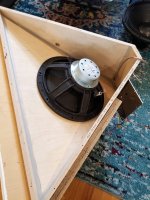
So I can start putting it together on the stand.
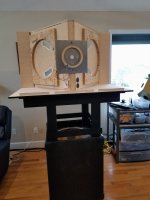
Ann then add the rest of the drivers.
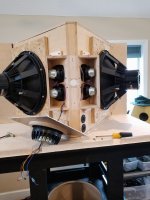
And then add the box.
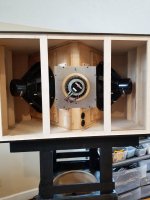
Finish the wiring and seal her up...
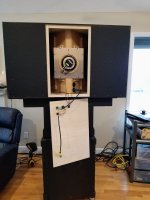
Done. Assembly went nicely....took about 4 hours yesterday......happy camper 🙂

Decided to see if I could retrofit a pair of 18" to an old synergy prototype....looked like it could work, providing a box could be built to wrap it.
The old proto is a 75x60 build that uses two 12"s, four 4"s, and a coax CD.

I'm like yeah, I can build a box around it, but it's going to be one heavy sucker. I'll need to build it on site, in its final resting place.
Decided I wanted to build it on a stand to match the height of other synergies sitting on tall subs. Used a vented sub box emptied and turned point up for the base.....(which already had coaster wheels, yay)

Built the box pieces and painted them. Time to assemble.
First thing was to mount the 12"s and seal them up the way the proto was designed.

So I can start putting it together on the stand.

Ann then add the rest of the drivers.

And then add the box.

Finish the wiring and seal her up...

Done. Assembly went nicely....took about 4 hours yesterday......happy camper 🙂
It has B&C dcx 464 CD and four 4NDF34 4", two Faital 12pr320 12"s, and two BMS 18n862 18"s.
So five ways.....one horn.
Did a quick one-axis tuning this morning, dying to see how low the 18's can run in the current sealed configuration. (Can easily add reflex ports if needed or desired.) And I wanted to hear the dang thing! Just a initial start, work to do....
Here's the tuning...my standard flat mag and phase with steep linear phase xovers.
Full range green trace in background. Sections as shown.
Xover points were 90, 300, 700, and 4000Hz. Playing with xover points now...currently changed slightly to 100, 250, 700, and 4000.
Sounds awesome...such clarity and dynamics.
It's interesting hearing a low freq all the way down to 30Hz coming out of this thing.

So five ways.....one horn.
Did a quick one-axis tuning this morning, dying to see how low the 18's can run in the current sealed configuration. (Can easily add reflex ports if needed or desired.) And I wanted to hear the dang thing! Just a initial start, work to do....
Here's the tuning...my standard flat mag and phase with steep linear phase xovers.
Full range green trace in background. Sections as shown.
Xover points were 90, 300, 700, and 4000Hz. Playing with xover points now...currently changed slightly to 100, 250, 700, and 4000.
Sounds awesome...such clarity and dynamics.
It's interesting hearing a low freq all the way down to 30Hz coming out of this thing.
Last edited:
The B&C dcx 464 is a coaxial CDLooking at the last picture in post #1 I can only figure out 4-way - where is the fifth? 🙂
//
Sure Rob, here ya go. Taken right at mouth so not all that valid / only indicative, but all i have for now.Mark100 can you share the raw measurements without correction?
Rob
Sections should be easy enough to pick out...let me know if not...
Thx von Ah, Paul, everyone,
HEXAAA, with a synergy I see the DI as kinda defined by the horn wall angles, which for this one is 75 deg horiz, and 60 deg vertical.
Yes, I want to make polar measurements, but honestly I'm not concerned at all with them past the 75x 60 pattern.
I'm mainly concerned with getting an average listening-window measurement to tune to, say a +/- 30 degree window.
Past that window, I'm doubting the value of DI for these big horns.
HEXAAA, with a synergy I see the DI as kinda defined by the horn wall angles, which for this one is 75 deg horiz, and 60 deg vertical.
Yes, I want to make polar measurements, but honestly I'm not concerned at all with them past the 75x 60 pattern.
I'm mainly concerned with getting an average listening-window measurement to tune to, say a +/- 30 degree window.
Past that window, I'm doubting the value of DI for these big horns.
Last edited:
Thank you sir 🙂Absolute mad lad
Keeps this 70 year old's membership in the Peter Pan Club active.....
well that, and continuing to sing along with the Lost Boys, "I don't wanna grow up ! "
and @ Allen, thank you too 🙂
Thanks NiToNi,Amazing Mark. But is there no way to avoid the 4NDF34?
yes the 4NDF34's can be totally avoided. A number of people have built syns using a CD that reaches straight to the low driver.
In fact I built about 8 different versions of such using either a b&c or bms coax CD going straight to 8"s, 10"s, even 12"s, typically crossing over at 500-650Hz.
And they all sounded excellent. Truly excellent, but all very close to each other with only minor lateral improvements.
Out of nothing else left to try that i could think of, i inserted some 4"s in between the CD and lows (that were already working just fine).
My mind is still a little blown at the increase in clarity that adding the small mids made.
I'm convinced until proven otherwise (which may well happen), that modulation distortion matters....and am trying to keep drivers' frequency range spans low.
So that's why the 4"s are there on this big guy too.
This build is mainly about trying to achieve a synergy that doesn't need a sub.
But you could still use a sub (or two), below it as you'd want to bring the synergy up to ear height anyway 😉. Spread that bass over more subs (multi-sub style), the synergy being part (2x) of them. You would effectively have a sub placed at a different height (the synergy) the other one close to the floor and with a bit of luck in placement, keep very tight stereo bass without any dips whatsoever at a very wide listening area. All well timed of course. The bass would act like a short array. It's the differences in their reaction (reflections etc.) to the environment of the separate sources that makes it worthwhile.
Offhand Mark, I would say this latest synergy is an immense achievement! pun intended. you did a nice job on the build too. I love how your dsp methodology works for crossovers.
I think you could get more out of the 4NDF34's as with them in place, you could use a 1" exit CD on the high end and dispense with the 12" woofers on the low end. I'm sure those 18"ers can play up to 250 hz. Something as big and heavy as this isn't going anywhere so it doesn't need to be able to play at pro levels.
I think you could get more out of the 4NDF34's as with them in place, you could use a 1" exit CD on the high end and dispense with the 12" woofers on the low end. I'm sure those 18"ers can play up to 250 hz. Something as big and heavy as this isn't going anywhere so it doesn't need to be able to play at pro levels.
I think most here realize that it probably doesn't take five ways to do the job (even down to <20 Hz), but I think everyone understands that you're reusing an existing MEH design. You could probably take out one or two ways easily, and still not materially affect the home hi-fi listening experience. If you were building your large MEH for PA duty outside, then the extra ways may be needed to handle outdoor PA levels (for power handling and controlling AM and FM distortion).
FWIW, I bet it sounds better than the new Danley HRE (nee "Hyperion"), especially if your drivers have smoother SPL response--particularly the compression driver. The Danley HRE/Hyperion begins to lose directivity control at ~500 Hz or higher due to its limited mouth dimensions. Spreading the horizontal coverage angle to 75+ degrees is also a big factor in your design sounding better than a narrower coverage MEH--like the SM-60 used in the Danley HRE/Hyperion. When I used the SH-50 as a center loudspeaker, I found that its horizontal coverage angle was just too narrow and I could point at the center loudspeaker while at the listening positions--something that should not be possible in a well designed multichannel array. Once I moved back to the K-402-MEH (having 90 x 60 degrees coverage), that issue of too narrow a horizontal coverage angle disappeared and the soundstage once again became continuous from side wall to side wall.
Getting the phase flattened, as well as smoothing out the SPL response is probably the next two design factors that equate to the "Synergy sound". Getting directivity control down to your listening room's Schroeder frequency (nominally 100-200 Hz) I've found is a really big deal.
As you might remember, I run a fully horn-loaded 5.2 array (shortened-down Klipsch Jubilees with TAD TD-4002 compression divers in the front corners, K-402-MEH in the center running as a three-way with BMS 4592ND, and AMT-1/Belle Klipsch bass bin surrounds--all bi-amped/tri-amped and phase flattened, and with TH-Spud clone subwoofers behind the Jubilees in the front corners). I've found that the effect of full-range directivity control and avoiding direct radiating woofers (i.e., avoiding AM distortion and compression distortion) makes a huge difference in the subjective listening experience.
Taking advantage of at least two room boundaries (wall/floor or corner) enables the woofers to be extended in their low bass response via EQ (just like what is typically done with small subwoofers) without a corresponding rise in harmonic and AM distortion...is also is a big factor in increasing the subjective experience in-room.
Chris
FWIW, I bet it sounds better than the new Danley HRE (nee "Hyperion"), especially if your drivers have smoother SPL response--particularly the compression driver. The Danley HRE/Hyperion begins to lose directivity control at ~500 Hz or higher due to its limited mouth dimensions. Spreading the horizontal coverage angle to 75+ degrees is also a big factor in your design sounding better than a narrower coverage MEH--like the SM-60 used in the Danley HRE/Hyperion. When I used the SH-50 as a center loudspeaker, I found that its horizontal coverage angle was just too narrow and I could point at the center loudspeaker while at the listening positions--something that should not be possible in a well designed multichannel array. Once I moved back to the K-402-MEH (having 90 x 60 degrees coverage), that issue of too narrow a horizontal coverage angle disappeared and the soundstage once again became continuous from side wall to side wall.
Getting the phase flattened, as well as smoothing out the SPL response is probably the next two design factors that equate to the "Synergy sound". Getting directivity control down to your listening room's Schroeder frequency (nominally 100-200 Hz) I've found is a really big deal.
As you might remember, I run a fully horn-loaded 5.2 array (shortened-down Klipsch Jubilees with TAD TD-4002 compression divers in the front corners, K-402-MEH in the center running as a three-way with BMS 4592ND, and AMT-1/Belle Klipsch bass bin surrounds--all bi-amped/tri-amped and phase flattened, and with TH-Spud clone subwoofers behind the Jubilees in the front corners). I've found that the effect of full-range directivity control and avoiding direct radiating woofers (i.e., avoiding AM distortion and compression distortion) makes a huge difference in the subjective listening experience.
Taking advantage of at least two room boundaries (wall/floor or corner) enables the woofers to be extended in their low bass response via EQ (just like what is typically done with small subwoofers) without a corresponding rise in harmonic and AM distortion...is also is a big factor in increasing the subjective experience in-room.
Chris
Last edited:
Hi Mark 😀
That is really a massive build. Looks kind of fascinating.
How comes that you did the tuning directly on axis. I think that you normally tune to some 10 degrees off-axis. I guess it is because of initial MONO-listening?
And there is still potential for further developments, like mounting secondary flares!
Thank you for sharing.
Steffen
That is really a massive build. Looks kind of fascinating.
How comes that you did the tuning directly on axis. I think that you normally tune to some 10 degrees off-axis. I guess it is because of initial MONO-listening?
And there is still potential for further developments, like mounting secondary flares!
Thank you for sharing.
Steffen
Hi again
You have me inspired. I am good at fantasizing! It´s harder to get something build. But I guess that is what we have you for 😉.
Is it really necessary that the ports for the 18´s are inside the horn? 1/4 wavelength summation could still work?
What if you build an 18´s sektion to mount your existing SYN10´s in, so that the 18´s fire from the sides, just outside the vertical horn-walls!?
I try to attach a s quick sketch.

Steffen
You have me inspired. I am good at fantasizing! It´s harder to get something build. But I guess that is what we have you for 😉.
Is it really necessary that the ports for the 18´s are inside the horn? 1/4 wavelength summation could still work?
What if you build an 18´s sektion to mount your existing SYN10´s in, so that the 18´s fire from the sides, just outside the vertical horn-walls!?
I try to attach a s quick sketch.
Steffen
- Home
- Loudspeakers
- Multi-Way
- Syn-11… a one-horn 5-way